
As the genocide in Gaza enters its 15th month, we look at From Ground Zero, a collection of 22 short films made in Gaza by Palestinian filmmakers surviving Israel’s bombings and brutal blockade. The film has been shortlisted for this year’s Academy Awards in the category for best international feature. “In spite of all what happened, we were trying to search for hope,” says filmmaker Rashid Masharawi, director of From Ground Zero, now playing in U.S. theaters. Masharawi was born in Gaza and has lost many relatives during the war. He says the film is an opportunity to focus on “the normal stories” of survival and perseverance, calling it “cinema for humanity.”
Transcript
AMY GOODMAN: This is Democracy Now!, democracynow.org. That was “Casualties of War” by Eric B. & Rakim.
We turn now to Gaza, where Israel continues to intensify its attacks, killing at least 35 Palestinians since dawn. Authorities have reported more than 70 killings over the last 24 hours, including in al-Mawasi, a region that Israel designated a so-called humanitarian safe zone.
As Israel’s relentless war on Gaza enters its 15th month, we turn now to a film that’s been shortlisted for this year’s Oscars, From Ground Zero, a collection of 22 short films made in Gaza by Palestinian filmmakers surviving Israel’s bombings. This is the film’s trailer.
FLOUR GATHERER 1: [translated] Isn’t this tragic?
FLOUR GATHERER 2: [translated] As you can see, we’re picking up flour and sand. That’s all we have left to do. We pick up whatever we find on the ground. We have to eat.
ON-SCREEN TEXT: 22 extraordinary stories.
FARAH: [translated] There are always drones making a buzzing sound. They are always above our heads when we sleep, study, dance.
ON-SCREEN TEXT: From 22 Palestinian filmmakers.
GAZAN GIRL: [translated] Mom wrote on my arm. If they bomb us and kill us, we’ll be identified from our names written on our bodies.
ON-SCREEN TEXT: Living through war.
MOSAB AL NADI: [translated] I was targeted three times in 24 hours. The first time, my cousin and I were returning from Camp 5. They attacked the house, and we were buried in the wreckage.
CIVIL DEFENSE WORKER: [translated] Mosab, who’s next to you? Khalid? Is he dead?
MOSAB AL NADI: [translated] [translated] Yes.
REEMA MAHMOUD: [translated] Believe me, my friend, I had a beautiful life in a beautiful city.
GAZAN MAN: [translated] We want to laugh, rejoice, sing and express our emotions. Yes, there are bombings and destruction and many other things that take us back to zero. But that only increases our challenge to overcome.
NOVELIST: [translated] Today, I want to tell you a story. Are you ready?
AHMAD HASSOUNA: [translated] Our greatest loss was not being able to see the film in front of the audience on the big screen.
HANA AWAD: [translated] No to injustice. No to violence. No to the violation of human rights. No! To everything that goes against humanity, joy, life. No to everything that destroys our hopes.
AMY GOODMAN: That’s the trailer for From Ground Zero, which has been shortlisted for the 2025 Oscars, along with two other Palestinian films, No Other Land and An Orange from Jaffa. The film is being released nationwide in the United States today. It made news recently when the acclaimed documentary filmmaker Michael Moore, Oscar-winning filmmaker Michael Moore, joined as executive producer.
We go now to France, where we’re joined by Rashid Masharawi, renowned Palestinian filmmaker, originally from Gaza, who curated and directed From Ground Zero.
This is an astounding collection, Rashid. I spent the night watching it and then watching it again. It is so deeply moving. Explain — not often do you see a director called “the curator.” Explain what you did.
RASHID MASHARAWI: Hi. Yes, usually, as a film director from Gaza, usually I am doing my own film. But this time for me, the situation was different. The images was different, the size of the massacre, the killing. We never witnessed something like this. So, then I decided, OK, my coming film or my next film will be made by filmmakers from Gaza, just to give the chance to 22 filmmakers to tell their own stories, their own daily life, to get closer to the details, because I believe these people must share their own stories with the world. At the same time, you know, we are filmmakers. We are trying to make cinema, to deal with art, with culture. In spite of all what happened, we were trying to search for hope. Yes.
AMY GOODMAN: I want to go to another clip. We played the trailer, but this is a clip of the short film Sorry Cinema, featured in From Ground Zero, where the director Ahmed Hassouna is fleeing for his life after an Israeli strike near his home in Gaza.
AHMAD HASSOUNA: [translated] Now my life has become a different kind of marathon. Now I am running to save my family’s lives, my own life. I run, hoping to find food and drink for my children, who flee the bombings from one house to another.
CAMERAPERSON: [translated] Ahmad! Are you OK? Where are you? Get out of there! Are you OK? Come! Come!
AHMAD HASSOUNA: [translated] I struggle to endure the things I see and hear, everything that is happening to us, everything we are going through. I have just lost my older brother in a random bombing next to his house.
What? The whole tower? Collapsed?
At that moment, I felt death catching up with us. Our only chance of survival was luck, our only chance of escaping the rubble, the bombed houses, the ruins of the city. Nowhere in Gaza is safe, especially in the north, where I currently live. Here, no humanitarian aid, nor rescue, nor civil protection arrives. All that comes are bombs, fear, stress and insecurity.
AMY GOODMAN: Talk about Ahmad Hassouna’s story, Rashid.
RASHID MASHARAWI: Yes, Ahmad, he was known in Gaza before the war. He’s a cinephile. He’s all his life spent after watching film, searching about films, trying to make films in Gaza, from Gaza. And all the time he was looking for an opportunity to make his new film.
During the war, I contacted Ahmad, and I told him, “Join me in my project, From Ground Zero. Be one of these filmmakers. This is your chance, because I’m going to show these films internationally and worldwide.” And immediately he said, “No, I don’t want to make a film, Rashid.” He said, “I am trying to save my family. I am searching for wood to make a fire to cook for the family. We are moving every day from one place to another. And just a few days ago, I lost my older brother. So I don’t want to make a film. Sorry for you. Sorry for the cinema, Rashid.” And I was shocked from his answer, because I know his love to cinema.
And then, two, three weeks later, I get back to him, and I say, “Ahmad, let’s make what you told me in our conversation. Let’s make a film about a filmmaker from Gaza. He have no time to make cinema because he’s trying to save his life. Show us something from your previous films. Show us your daily life. And show us how you are going to make it to say, 'Sorry for the cinema.'” And then we agree, and we come with this film, the one that everybody watching now, Sorry Cinema.
I think people must know, beside all these peoples who’s martyrs, we talk about — it’s been more than 50,000 now, most of them — most of them are innocent. Most of them are people who’s really searching for life, people like Ahmad Hassouna. He want to be a filmmaker. In From Ground Zero, we have many people, want to be a painter, want to be stand-up comedy. They want to be dancers — people like any other people in the world trying to manage their own dreams. And I was interested in these people to tell the stories, the normal stories, the real life under all this massacre and genocide.
AMY GOODMAN: You were born and raised in Gaza, Rashid Masharawi. Through the making of this film, you also witnessed the destruction of your home. Your reflections as you tried to encourage these filmmakers? They’d be in the middle of a film. They’d lose a family member. They’d lose many members of their family, talking to you about not being able to go on.
RASHID MASHARAWI: Yeah, yes. It means, for me, it was logical, normal, that I will be involved in From Ground Zero. As a Gazan, all my family are in Gaza now. And as you say, we lost many people from my family. And we lost our houses. We lost — I lost all the neighborhood where all my memory, my school, my childhood dreams, friends, for sure, neighbors, for sure, and many things. But still, you know, I am someone known as I’m always optimistic. I’m always having hope. I believe in cinema, in art. I trust cinema, you know, because I think cinema should play the role that it’s playing in From Ground Zero, cinema for justice, you know? A cinema for humanity. A cinema just to remind the world all the time we are all humans, we are the same, we have the same dreams.
Many people was killed because they were in Gaza at this location, at this time, and it has — they have nothing to do with what’s going on, women and kids and old people. OK, we know what happened on 7 October. We know when Hamas get out and they attack and they hostage people and they kill people and they arrest people. Me, myself, I know also many, many massacres that the Israelis did before 7 October. This struggle, it started more than 77 years ago, before 1948.
And we have — as Palestinians, we have to keep telling our stories. We have to fight to make good cinema also and to share all these stories with the world. I am very happy — I am very happy that these films are now crossing the U.S., showing in many cinemas. And I will be very happy when many people just go and watch, because it’s not the news. It’s not reportage. It has something else. It has nothing to do with politics even. It has something to do with our world that we are all sharing. We are looking for justice.
AMY GOODMAN: Rashid Masharawi, yes, the film is opening today in cinemas across the country. It’s also gotten headlines because the award-winning filmmaker, Oscar-winning filmmaker Michael Moore has joined you as executive producer. Now, he won the Palme d’Or for the documentary film Fahrenheit 9/11, becoming the first and only documentary to win there. Your film was accepted at Cannes, where he won the Palme d’Or, but then rejected? And what did you do?
RASHID MASHARAWI: I think our films were from the beginning rejected. I mean, we never was accepted in Cannes. We were in discussing with Cannes to try to show even not all From Ground Zero, some films from ground zero, because I was coming to Cannes with films and filmmakers, you know? And I think they don’t want to deal with us. Even they say it in the press conference of Cannes before the festival. They don’t want to deal with the tension or with the political, with all what’s happening in the area. It was only Gaza. It was only Palestine. I remember two years before when the president of Ukraine was having space in the opening of Cannes, making speech.
AMY GOODMAN: Right. That was President Zelensky.
RASHID MASHARAWI: Yes. It was also to deal with the war and to deal with politic. You know, I feel sorry for Cannes Film Festival, because I consider Cannes Film Festival, it’s an important festival, good festival, big festival. It should make its job. It should play its role to give space, to give stage to filmmakers and to cinema and to protect humanity through cinema, through art, through filmmakers. And they didn’t. I think they lost the opportunity to be. It means they were there, and we were also there.
So, I say, then, if Cannes don’t want to go to Gaza, Gaza will go to Cannes. So I take my team. I built our tents in Cannes like the tents in Rafah exactly. We have our own screenings, our own sound, our own audience. And we make our own films. We make the people from Gaza to speak, the filmmakers to speak inside Cannes with the audience. And we bring Gaza to Cannes during the festival. But officially, we were not in Cannes.
AMY GOODMAN: Rashid, we just have a minute. So, to clarify, it wasn’t originally accepted at Cannes, but it is premiering here in the United States across the country. You partnered with Watermelon Pictures, the first distribution company for Palestinian films in the U.S. We have 30 seconds. The significance of this collaboration?
RASHID MASHARAWI: I am really, really proud, you know, with what they are doing, Watermelon. I feel that I already won the Oscar, because my aim is to show these films to maximum people, and this is what Watermelon is doing. They are showing these films everywhere. And also the input, what Michael Moore bring to these films, it’s really to join us and to share the stories with many, many, many people. I just can appreciate and thank from all my heart for all these people who participate and help and support From Ground Zero.
AMY GOODMAN: Rashid Masharawi, we want to thank you for being with us, renowned Palestinian filmmaker from Gaza. He curated the Oscar-shortlisted From Ground Zero, being released in theaters nationwide in the United States today.
Next up, an update on the impact of the bombing of Yemen. Stay with us.
[break]
AMY GOODMAN: “Winter in America” by Gil Scott-Heron, Brian Jackson and The Midnight Band. Soul of The Midnight Band and former Black Panther Bilal Sunni Ali passed away December 30th. It was said, “When he played his horn, he put fear in the oppressor and brought hope to the oppressed.”

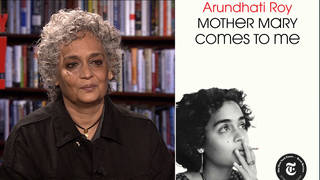
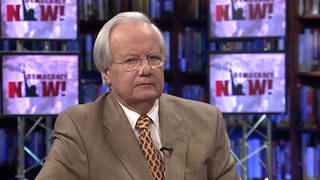
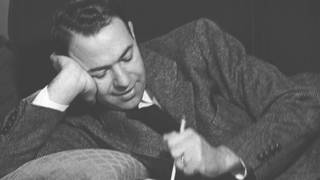
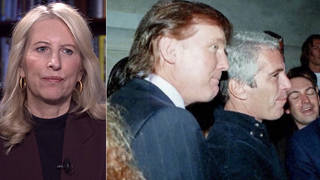
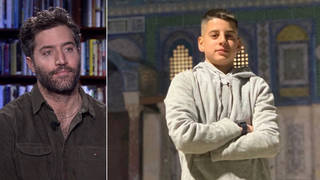






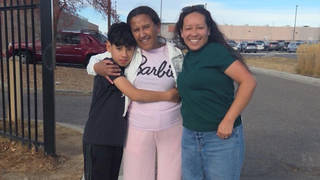
Media Options